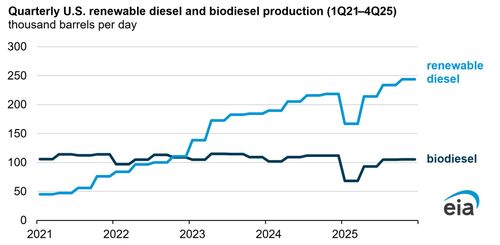EIA: US renewable diesel production and biodiesel production declined in Q1 2025

Data source: U.S. Energy Information Administration, Petroleum Supply Monthly and Short-Term Energy Outlook, May 2025
June 5, 2025
BY U.S. Energy Information Administration
U.S. production of renewable diesel and biodiesel fell sharply in the first quarter of 2025 because of uncertainty related to federal biofuel tax credits and negative profit margins. We forecast production of both fuels to increase as the year progresses but biodiesel production to remain less than in 2024.
Renewable diesel and biodiesel are biomass-based diesel fuels that can replace petroleum-based distillate and be used to comply with renewable volume obligations in the Renewable Fuel Standard administered by the U.S. EPA. Renewable diesel can be used in diesel engines in any concentration because it is chemically equivalent to petroleum-based distillate fuel, and biodiesel is typically blended with petroleum distillate at concentrations of 20% or less for vehicle consumption because of some chemical differences.
Advertisement
Advertisement
In January 2025, U.S. production of biodiesel fell to 60,000 barrels per day (b/d), the least since January 2015, and about 40% less than in January 2024. U.S. biodiesel producers only partially ramped up production in February and March, bringing the quarterly production to about 70,000 b/d, a decrease of more than 30% from 1Q24.
U.S. renewable diesel production averaged about 170,000 b/d in 1Q25, down 12% from 1Q24. The decrease in renewable diesel production was not as large on a percentage basis as the decrease in biodiesel production, mostly because renewable diesel production increased at a greater rate than biodiesel production in 2024. Reduced output at renewable diesel plants was partially offset by the nearly 20% increase in renewable diesel production capacity since 1Q24. However, compared with 4Q24, when renewable diesel production capacity was comparable to current levels, 1Q25 production was down almost 25%.
Poor profitability in 1Q25 contributed to production declines. Diamond Green Diesel, Phillips 66, and Marathon all reported operating losses from renewable diesel in the quarter. In addition, trade press has suggested negative margins for biodiesel.
Advertisement
Advertisement
Another reason U.S. production of biomass-based diesels declined in 1Q25 was uncertainty about federal biofuel tax credits. Before 2025, producers and importers of biomass-based diesel received a $1 per gallon (gal) blender’s tax credit (BTC) for each gallon blended with petroleum diesel. Under the Inflation Reduction Act, the BTC was slated to be replaced with the Section 45Z Clean Fuel Production Credit in 2025. This new credit would change the flat $1/gal tax credit to a value based on the carbon intensity of the feedstocks used. However, delays in releasing final guidance for the tax credit has left biofuel producers unsure about their profitability, causing some producers to idle operations.
We forecast production of renewable diesel and biodiesel to increase as the year progresses to meet existing RFS mandates. In our May Short-Term Energy Outlook, we forecast 2025 annual renewable diesel production to increase about 5% from 2024 because of increased capacity. We forecast 2025 annual biodiesel production to be 15% lower than in 2024 because of low production early in the year and an assumption that some biodiesel plants with less favorable economics may close.
Related Stories
The U.S. Energy Information Administration maintained its forecast for 2025 and 2026 biodiesel, renewable diesel and sustainable aviation fuel (SAF) production in its latest Short-Term Energy Outlook, released July 8.
XCF Global Inc. on July 10 shared its strategic plan to invest close to $1 billion in developing a network of SAF production facilities, expanding its U.S. footprint, and advancing its international growth strategy.
U.S. fuel ethanol capacity fell slightly in April, while biodiesel and renewable diesel capacity held steady, according to data released by the U.S. EIA on June 30. Feedstock consumption was down when compared to the previous month.
XCF Global Inc. on July 8 provided a production update on its flagship New Rise Reno facility, underscoring that the plant has successfully produced SAF, renewable diesel, and renewable naphtha during its initial ramp-up.
The USDA’s Risk Management Agency is implementing multiple changes to the Camelina pilot insurance program for the 2026 and succeeding crop years. The changes will expand coverage options and provide greater flexibility for producers.
Upcoming Events










